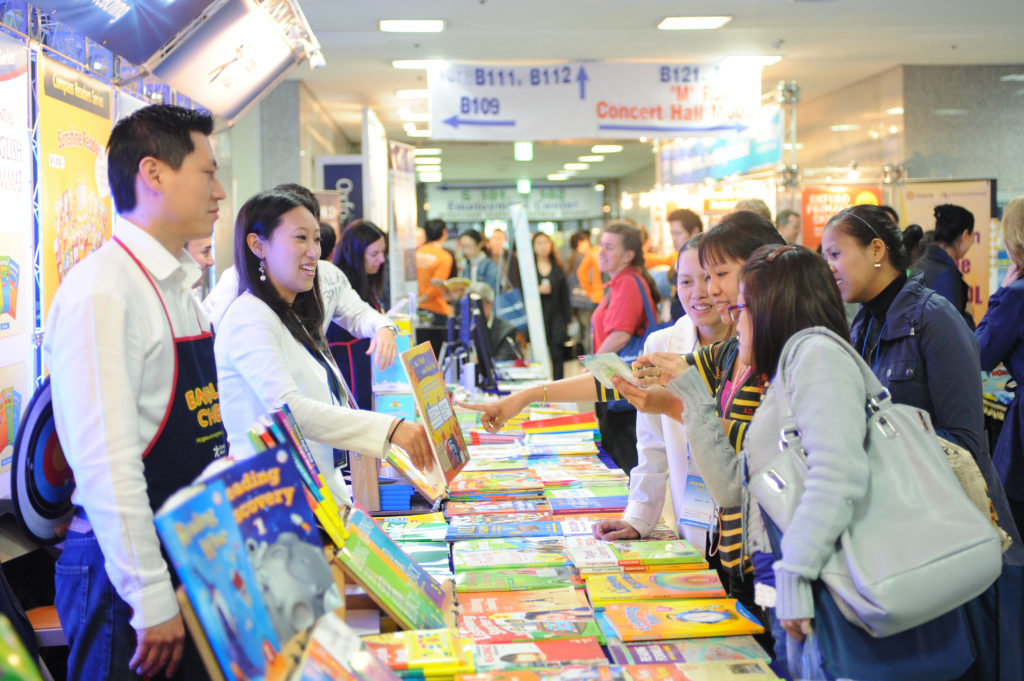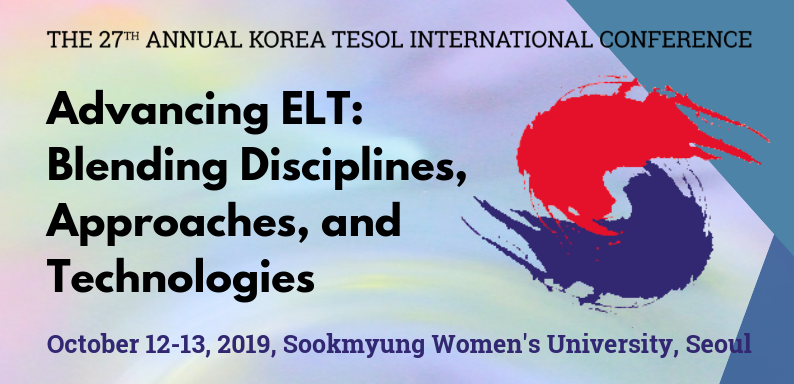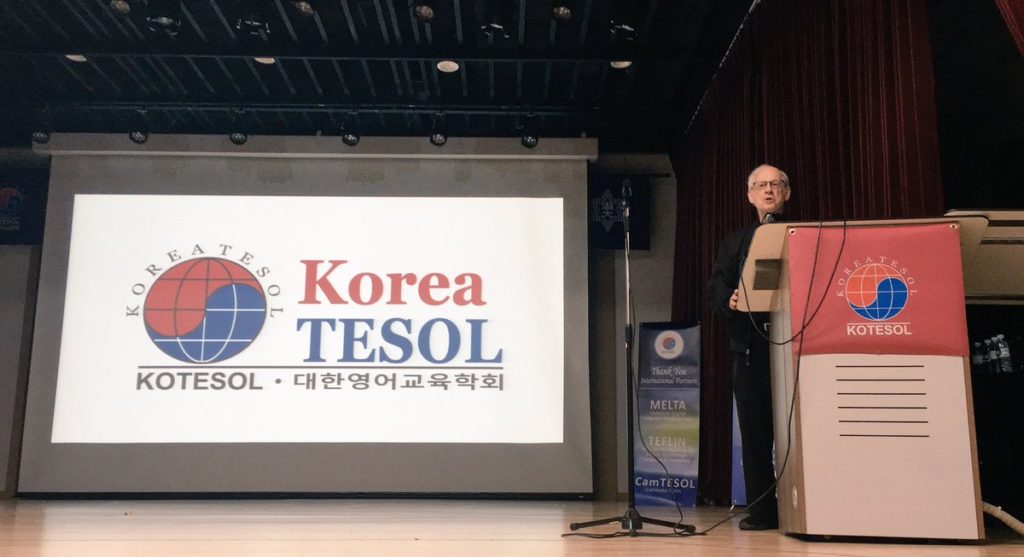Why Go to an ELT Conference?
Written by Dr. David E. Shaffer.
“There’s a conference coming. An English teaching conference. A big one. It’s coming to Seoul this autumn. A Korea TESOL, or KOTESOL, conference, I think.”
“A conference. Are you thinking of going?”
“Hmm… Why should I go to an English teaching conference?”
The buzz is out there. The annual Korea TESOL International Conference is coming in October – the 12th and 13th, to be exact – and I suppose that there are a lot of English teachers around Gwangju, and elsewhere, asking themselves why they should even consider going to this conference. In this article, I will embark on that mission of convincing those who have not yet attended a conference as well as naysayer English teachers that they could benefit considerably from attending conferences and that the conference that classroom teachers can benefit most from attending is the Korea TESOL International Conference (I will abbreviate it as the “KOTESOL IC” or just “IC”).

The “Community”
I will begin with a concept that many of you may think of as being insignificant: the sense of community. The KOTESOL IC attendees are, for the most part, classroom English teachers – classroom practitioners like those at your school, in your teachers’ room, or at frequented downtown establishments. But if you think about it, teachers do not spend much time together. They are usually in a classroom with students; and when they are with other teachers, they are usually not talking about how to be better teachers.
KOTESOL IC attendees are there for professional development. That can come is several forms. While a conference’s presentation sessions are an obvious source of professional development, another is through conversing with other attendees. The KOTESOL slogan might explain it best: Teachers Helping Teachers – Learn, Share, Succeed. KOTESOL ICs are known for their warmth and the sincerity of attendee-to-attendee interaction both in workshop sessions and in the breaks between sessions. The IC realizes the importance of attendees having time to share with each other in informal situations. That is why there is a 15-minute break between each session throughout the two-day conference. Some attendees consider the community atmosphere as the most important aspect of the conference: meeting new people, forming new friendships, discussing teaching concepts, collaborating on future research projects.

The Presentations
Many people I have talked to have the mistaken opinion that conferences are all about listening to research done by the presenter. KOTESOL IC organizers, however, are quite aware that IC attendees vary greatly in their English language teaching (ELT) interests: Some have interest in research, others in teaching methodology, some in language learning games and activities, and others in a little bit of everything. Some have PhDs in applied linguistics; others are fresh out of college. Some are interested in cutting-edge theory; others are interested in ELT basics. And there are many somewhere in-between.
While other ELT conferences are mainly research paper presentations, the KOTESOL IC is different. We like to think that we have something for everyone. While there are 20-minute research report sessions on almost any ELT-related topic you can think of, there are also a large number of 45-minute talks and hands-on workshops on just as wide a variety of topics. The IC also has poster sessions, where the presentations are attached to bulletin boards and the presenters deliver their content and answer questions for anyone who comes by. In addition, there will be a number of panel discussion sessions and sessions organized by our various special interest groups. And there will even be a couple of Saturday morning introductory sessions for first-time attendees on how to get the most out of the conference.

The Invited Speakers
KOTESOL prides itself on being able to attract many of the major authorities in ELT and second language acquisition (SLA) to speak at our conferences. Last year’s plenary speakers, for example, were Dr. Stephen Krashen and Prof. Scott Thornbury. At this year’s IC, our Saturday plenary speaker will be Dr. Rod Ellis, widely known for his work in SLA and, in more recent years, in TBLT (task-based language teaching). Dr. Andrew D. Cohen will be our Sunday plenary speaker. Much of his recent work has been related to language learner strategies. He will also be leading a two-hour workshop.
In addition to our plenary speakers, we will have nine featured speakers, most of whom will be coming from outside of Korea. For those interested in professional development, reflective practice authority Thomas Farrell (Canada) will be giving a featured session and leading a workshop. TV and radio personality, professor, and CEO Boyoung Lee will be informing us on unexpected learning initiative taken by young learners. Kara Mac Donald (US) will be sharing the need to draw on skillsets outside of ELT. Heyoung Kim (Korea) will tell us how we can bring artificial intelligence into the young learner classroom, and Peter Roger (Australia) will tell us what we can learn from medical education. Curtis Kelly (Japan) will disclose neuroscience insights into language learning, and Stephen Ryan (Japan) will talk about a person-centered approach to language learning. Birsen Tutunis (Turkey) will show us how to blend disciplines for effective classroom management, and Bodo Winter (UK) will talk about how gestures talk. Their topics all seem super interesting, and the cool thing is that their featured sessions will be scheduled so that you will be able to attend each of them!
The Other Good Stuff
A conspicuous component of any conference are the promotional displays. ELT-related firms, book publishers in particular, will be participating in the KOTESOL IC, displaying books, sometimes providing inspection copies and giving promotional sessions. Saturday evening features a wine-and-cheese membership social. And under “good stuff,” I will mention the IC registration fee. KOTESOL works hard to keep the fee down to about one-fifth that of a comparable international conference. Pre-registration ends September 30. You will not want to miss this opportunity to attend the 2019 KOTESOL IC, October 12–13, at Sookmyung Women’s University, Seoul. Details at https://koreatesol.org/IC2019.
The Author
David Shaffer has lived and worked in Gwangju since the early 1970s. As president of KOTESOL and a member of the KOTESOL IC organizing committee, he invites you to attend the 2019 KOTESOL IC. As vice-president of the Gwangju-Jeonnam Chapter of KOTESOL, he invites you to participate in the teacher development workshops at their monthly meetings. Dr. Shaffer has been a career professor at Chosun University and is a long-time member of KOTESOL. He is presently the board chair at the Gwangju International Center and also editor-in-chief of the Gwangju News.







